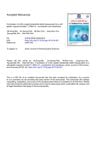 19 citations,
September 1995 in “Food and nutrition bulletin”
19 citations,
September 1995 in “Food and nutrition bulletin” Leucaena leucocephala is nutritious but needs careful processing to remove toxins.
 18 citations,
June 1998 in “Circulation”
18 citations,
June 1998 in “Circulation” Mild essential fatty acid deficiency can cause health issues and is worsened by low-fat diets.
 14 citations,
September 2019 in “Eye”
14 citations,
September 2019 in “Eye” Some oral medications may help treat central serous chorioretinopathy, especially eplerenone, but more research is needed.
 14 citations,
January 2016 in “Elsevier eBooks”
14 citations,
January 2016 in “Elsevier eBooks” Liposomes improve the delivery and effectiveness of cosmetic ingredients but face challenges like cost and stability.
 13 citations,
January 2016 in “Journal of cosmetology & trichology”
13 citations,
January 2016 in “Journal of cosmetology & trichology” Alternative treatments show promise for hair growth beyond traditional methods.
 12 citations,
September 2018 in “International Journal of Cosmetic Science”
12 citations,
September 2018 in “International Journal of Cosmetic Science” Palmitoyl tetrapeptide-20 may help reduce hair greying and increase melanin production.
 12 citations,
September 2018 in “Journal of Drug Delivery Science and Technology”
12 citations,
September 2018 in “Journal of Drug Delivery Science and Technology” The silk fibroin hydrogel with FGF-2-liposome can potentially treat hair loss in mice.
 9 citations,
November 2009 in “Recent Patents on Drug Delivery & Formulation”
9 citations,
November 2009 in “Recent Patents on Drug Delivery & Formulation” Microemulsions could improve how drugs are delivered and absorbed in the body.
 8 citations,
December 2020 in “The FASEB Journal”
8 citations,
December 2020 in “The FASEB Journal” Blocking adenosine A2B receptor may prevent or treat hearing loss.
 4 citations,
May 2019 in “Asian Journal of Pharmaceutical Sciences”
4 citations,
May 2019 in “Asian Journal of Pharmaceutical Sciences” Created tablet similar to Avodart using γ-cyclodextrin and solubilizers.
 2 citations,
October 2022 in “International journal of Ayurvedic medicine”
2 citations,
October 2022 in “International journal of Ayurvedic medicine” Licorice has many traditional health benefits, but more research is needed to fully support these claims.
 1 citations,
November 2015 in “Indian Journal of Clinical Biochemistry”
1 citations,
November 2015 in “Indian Journal of Clinical Biochemistry” The conference presented findings on how vitamin D levels, genetic factors, and lifestyle choices like smoking and yoga affect various health conditions and diseases.
 July 2024 in “ADMET & DMPK”
July 2024 in “ADMET & DMPK” Surface-modified nanostructured lipid carriers can improve hair growth treatments.

The new gel for hair loss is safe, effective, and reduces side effects.
 January 2013 in “Springer eBooks”
January 2013 in “Springer eBooks” Hair care products are important for appearance and self-esteem, and choosing the right ones can help maintain healthy hair.
91 citations,
November 2008 in “Journal of biological chemistry/The Journal of biological chemistry” DGAT1 enzyme is crucial for healthy skin and hair by regulating retinoid levels.
3 citations,
February 2024 in “International journal of molecular sciences” Hesperidin from orange peels is a promising natural ingredient for skincare due to its multiple beneficial properties.
258 citations,
July 2005 in “Journal of lipid research” DGAT1 enzyme helps make diacylglycerols, waxes, and retinyl esters.
 131 citations,
September 2017 in “Molecular and Cellular Endocrinology”
131 citations,
September 2017 in “Molecular and Cellular Endocrinology” The document concludes that blocking the internal pathways that create androgens might help treat cancers that depend on sex hormones.
110 citations,
April 2020 in “Advances in Wound Care” Nanotechnology shows promise for better chronic wound healing but needs more research.
 96 citations,
September 2021 in “International Journal of Molecular Sciences”
96 citations,
September 2021 in “International Journal of Molecular Sciences” Chitosan, a natural substance, can be used to create tiny particles that effectively deliver various types of drugs, but more work is needed to improve stability and control of drug release.
88 citations,
June 2019 in “Cell reports” Certain small molecules can promote hair growth by activating a cellular cleanup process called autophagy.
67 citations,
December 2013 in “Journal of Biological Chemistry” SCD1 is crucial for skin health and overall energy balance.
 57 citations,
October 2021 in “Journal of ethnopharmacology”
57 citations,
October 2021 in “Journal of ethnopharmacology” Indian herbal medicine shows promise for treating skin diseases but needs more research to prove effectiveness.
54 citations,
June 2020 in “Pharmaceutics” New nanocarriers improve drug delivery for disease treatment.
13 citations,
November 2022 in “Biomaterials Science” The microneedle patch effectively promotes hair regrowth by delivering miR-218.
5 citations,
December 2023 in “Materials” Organic and biogenic nanocarriers can improve drug delivery but face challenges like consistency and safety.
5 citations,
April 2022 in “Pharmaceutics” Minoxidil nanoparticles significantly boost hair growth in mice compared to regular minoxidil.
5 citations,
September 2013 in “BMB Reports” BMPR1a-ECD reduces wrinkles much more effectively than retinoic acid.
 3 citations,
May 2023 in “International Journal of Molecular Sciences”
3 citations,
May 2023 in “International Journal of Molecular Sciences” A new treatment using nanoparticles can effectively prevent and reduce hair loss caused by chemotherapy.



















